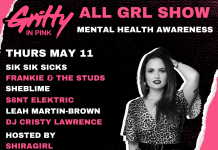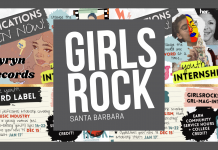The WiMN’s Front and Center is a weekly column that showcases accomplished women who work in the music and audio industries. We spotlight successful female performers, manufacturers, retailers, educators, managers, publicists, and everyone else in between. Want to be featured? Learn how here.
Front and Center: Executive Director, Curriculum Designer and Instructor at Phoenix Conservatory of Music, Regina Nixon
By Gabriella Steffenberg

Music and education have always been at the forefront in Regina Nixon’s life. Working with the Phoenix Conservatory of Music (PCM) since its early days, Nixon has been an essential part of the growth and impact that it’s had in the Phoenix community.
Due in part to its collaboration with Berklee College of Music and its prestigious Berklee City Music Network, PCM became one of 47 affiliate members across the country to recieve the Arts Education Organization of the Year honor at the Arizona Governor’s Arts Awards in 2015.
Head to phoenixconservatoryofmusic.org to learn more about PCM, and read below to find out more about Nixon in this week’s Front and Center.
WiMN: At what point did you realize that you wanted to dedicate your life to music?
RN: Music has always been a huge part of my life and a huge part of my family. I knew I wanted to be a singer when I was five. I didn’t know until my late teens/early ‘20s that I wanted to be an educator. Music is a part of my soul.
Even though most of the time I spend doing administrative things relating to music education, there are times that I need to sing just to stay sane. It is more than a job; it is a calling, and for me, a mission.
WiMN: You’ve been with Phoenix Conservatory of Music for over 15 years. How have you seen the conservatory grow throughout your time with them?
RN: I have been with the organization since its infancy. When our founder retired, our annual budget was $69,000 per year. Since that time, we have grown considerably, serving our students in a deeper way that has lasting impact and long-term outcomes, and our budget has grown to nearly a half a million dollars.
From my living room to our current 7,500-square-foot facility, it has been a remarkable journey (a nerve-racking, exhausting, harrowing, but remarkable journey), but one well worth the cost and that I would repeat again in a heartbeat. I would not have been able to continue on that journey without the dedication and support of our many donors, volunteers, teaching artists and community or without the love, patience, and commitment to the cause from my husband and daughter who have sacrificed right along with me to make PCM a reality.
WiMN: Tell us of a standout student experience you’ve had at the Phoenix Conservatory of Music.
RN: I always say that the most favorite part of my job is our students. I love these kids. They inspire me and humble me. Here are just a few stories with our students:
Abraham: Phoenix Conservatory of Music changed my life, simple as that. I wasn’t focused, I didn’t follow through on things. When I got to PCM, I was just starting junior high; my grades weren’t that good and I didn’t have good time management. At first, I thought I wanted to play piano, but here I discovered guitar. I loved everything about it; learning theory, learning music history, learning how to compose music, learning how to use my fingers most effectively, learning how to prioritize, how to focus. I discovered I could manage my life better, my grades got better, I am really good at math and at science. Before PCM? Musical, yes – but disciplined, no. Because of PCM, I am a changed person, for the better.
Ben: Before PCM, I lacked follow-through, I didn’t realize I had potential, and I didn’t take my talent seriously. In just two years, I’ve gone from being scared to death on stage to having the time of my life. It’s because of the support team that’s here, the relationships that are built, and the connections we make. I love being the lead singer of a group of amazingly talented musicians. Being part of a master class at Berklee City Music Network really solidified what I want to do with my life. I am going to audition for American Idol this spring, and I’ve got all my friends here at PCM helping me with that audition; they’ve got my back. It’s like the first time I went on stage, I was scared, yes, but then I turned around and saw all those musicians behind me, rooting for me, supporting me, and I didn’t want to disappoint them. Before PCM? I wouldn’t have been that reliable. I would slip in late for everything; I didn’t think it mattered. Now, I know it does, that we all depend on each other to be the best we can be.
Another one that sticks out for me is with one of our recent PCM graduates. He is currently a freshman at Berklee College of Music. He started with us when he was 12 years old. I was never his primary teacher, but I was a mentor. Musically, he is very gifted. In looking back at our time together, the skill sets we were developing were not just his musicianship, but all the other developmental assets he needs to be successful in life – teamwork, collaboration, positive leadership skills, forward thinking, backwards mapping, developing relationships.
The time had come for his senior year auditions. The auditions went well and he heard back fairly soon that he was accepted to the college. Now we were waiting to hear about scholarships. The day came. We received notification that one of his peers had received a full tuition scholarship, but he did not get any notifications. We were talking, and I asked him if he was ok. He said he was. Later that night about 11 p.m., he called and said he was not ok. We had a great conversation about paths and many roads to get to the same destination and developing a good plan b.
The following Saturday he saw his fellow student for the first time since the scholarship announcements were made. I was a bit nervous about how the interaction was going to go. He went to his band mate, and gave him the most sincere congratulations and a huge hug. It made my heart happy. This is the moment that we live for in education. At that moment, I was more proud of this young man than if he would have gotten a full tuition scholarship because of the strength of character that he had shown. This is why we teach. To top it off, later that night he received notification that he also received a full tuition scholarship – but that was just icing on an already pretty sweet cake.
WiMN: What is your involvement with Berklee College of Music? How have they helped grow your program?
RN: In March of 2010, we were paid a visit by the Berklee College of Music in Boston – one of the premier music schools in the country. Through a highly competitive process that included a site visit, student performances, and consideration of our organization’s health, Berklee College of Music awarded us an affiliate membership into The Berklee City Music Network. This is a stamp of approval from one of the premier music schools in the country for our programs. There are 47 affiliate members throughout the country – only 5 in the southwest region – and we are the only school in Arizona. As an affiliate member, we bring an amazing resource to our community through the Berklee PULSE Program.
PULSE is an online learning network that stands for Pre University Learning Systems Experience. Its goal is to teach quality college preparatory music education through technology. This allows us to take a STEM experience and integrate Technology with Arts to turn STEM into STEAM. Because of this amazing partnership, we began to grow and hone our niche in our community.
In 2011, Metrocenter Mall donated 7,200-square-feet for a unique community music recreation center to house our newly formed college prep program ensembles. We started the ensembles so we could give the students the skill sets they needed to be successful in a college environment. With just 15 kids we started the program, and we needed space for them to rehearse. The mall stepped up. So now, we have this new program and this new facility.
We decided to leverage both for all they were worth and developed a community music learning center in our local mall. For many years, community centers have proven themselves to be vital for the improvement, engagement, and investment of families and revitalization of neighborhoods. Phoenix Conservatory of Music used the community center model and created a community music recreation center that actively promotes arts, specifically music education. These two elements combined really pushed us to the next level of our organizational development. Our earned and contributed revenues are growing and we are gaining local and national recognition for program facilitation.
Our partnership with Berklee provides much needed professional development, mission alignment, and the chance for our organization to be a part of a national paradigm shift in music education. In 2015, Phoenix Conservatory of Music was honored as the Arts Education Organization of the Year recipient at the Arizona Governor’s Arts Awards. In 2015, we had seven seniors. We had three seniors who auditioned for Berklee College of Music, and all three were accepted.
Since 2013, we have a 65 percent acceptance rate to one of the most prestigious music colleges for contemporary music study in the world. In 2015, Berklee City Music Network awarded only 15 full tuition college scholarships. Two of those scholarships went to Phoenix Conservatory of Music students, a total value of $360,000. The rest of our 2015 class has been admitted to Grand Canyon University, Northern Arizona University, and Arizona State University studying music, pre-med, economics, and education.
In addition to the great benefits that we utilize through Berklee College of Music and the Berklee City Music Network for our students and our teaching artists, as an individual I find it empowering to be a part of a group of people that I absolutely admire and respect. I sit on several committees and feel like I am making a difference on a national level. Being around such like-minded people who are just as committed to our young people and helping them fill their potential through contemporary music education helps me personally to recommit to my personal mission in my community. I am honored to get to be part of such an exciting movement.
 WiMN: What’s your favorite part about working in music education?
WiMN: What’s your favorite part about working in music education?
RN: For me, it’s all about the kids. I just happen to be a musician, so this is how I reach out. If I were a baseball player, I’d be working with a baseball team for kids. But I’m a musician and its how I can communicate and help future generations find that special part of themselves that will help them to fulfill their personal potential.
WiMN: What’s the biggest lesson you’ve learned in your time working in the music industry?
RN: Good music making is really about listening and having a conversation. We have two ears and one mouth. Listen twice as much as you speak.
WiMN: What pieces of advice to you have for women looking to work in the music business and education?
RN: Find your passion. Work is a four-letter word.
I was watching a comedy skit (I think it was with Chris Rock), and the comic was talking about the difference between jobs and careers. The gist of the routine was that in a job, you watch the hours drag and the minutes tick by. But with a career, people have to remind you to stop working and go home.
Have a career. Have a calling. Life’s too short to watch a clock. Do what you love, what inspires you and inflames you, and figure out how to monetize it to provide for you and yours. Don’t give up. Being in the music industry or being in the education industry is not easy. If it was easy, everyone would do it. But your voice matters; your experiences can nurture, inspire, create connections and reach people.
WiMN: Where do you hope to take the Phoenix Conservatory of Music within the next five years?
RN: There are things I desperately want for our organization: a permanent facility with actual walls designed to minimize sound bleed; more lesson rooms; a functioning recording studio; a window in my office; infrastructure and staff to continue to serve the growing need in our community; the resources to securely pay for the infrastructure and increase of staff needed to run more programs because of the growing need; twice a week janitorial services – these are all things we need. In addition, we need a working cash capital reserve and six months of funds in the bank; an endowment to pay for private lesson music scholarships for students in need; and a slush fund to pay for programs that are risky, innovative and creative.
In my heart of hearts, one of the long-term creative risks I want the organization to undertake is starting an artist development branch and youth-run label where we can nurture young talent in an even deeper way than we are, providing them with the practical skill sets that they need in their craft development, but also in their professional development including budgeting, marketing, and industry knowledge.






